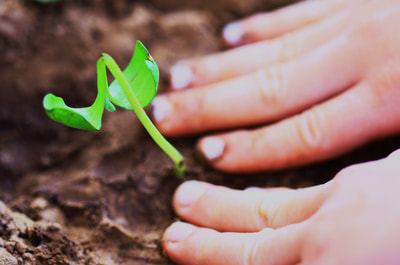|
You may ask yourself in which relation plants, children and computers could possible stand, so let's explore this notion a little. As most of you who know me have observed many times, I have an invested interest in proper parenting, child-rearing and, specifically, sufficient and plausible education - within schools and homes likewise. I have written (and spoken) extensively on the above-given matters and although I consider myself to be quite versed in the idea of proper parenting, it is obviously still a personally unexplored topic as I do not have children at this point. I have, however, worked as a teacher, nanny and tutor and therefore feel rather confident to speak about prevailing school systems and how they are entirely flawed. Today I want to talk about the notion of children (and people in general) being treated as trivial systems, as opposed to non-trivial systems, which they inherently are. Now, you may think, what is this woman talking about? Well, in short, a trivial system - like a computer - functions in a way that given the same input, you are always served with the same output, whereas non-trivial systems - like humans - will always provide as many outputs as there are humans given input - and they will vary from each other drastically. An example. If you give computers the same set of information, you will find the same outcome on each computer to be used in the same way. However, if you give humans one set of information, for instance the question of "How are you today?", you will get as many outputs as people you have asked because the brain does not work like a computer.
This in itself is interesting, but how does it relate to children or people in general? Well, consider our school systems. We have established a system which feeds information to pupils to be processed in the same amount of time and, then, to provide the same output, by which a "deviant" output is punished as a "mistake". It becomes clear very quickly how much this resembles a trivial system inasmuch as we would treat a computer who does not provide the same output as all the others would also be considered as "mistake" (and rightfully so, nobody wants to be stuck with a computer who does weird things with your precious files or starts playing music videos when you try to access your email account). As much as this merciless mistake-centred system works for programming computers, it is entirely harmful to growing a human brain - and here you see where the plants come into the concept. It is crucial to understand that children, and humans in general, develop like plants. Provided with the right soil and the right circumstances, the child or plant can grow and flourish, whereas it will dehydrate or wither if not supplied with enough nourishment. For a plant, this nourishment would be water and sun, for a child it is love, patience and understanding. Many parents and teachers I have met try to raise children up, but this is counterproductive. The only thing you can do - and should do - is create an environment in which the child can pull itself up and flourish, as otherwise it will - like a plant - perish or wither. Additionally, like plants, children have setbacks in their development. They're not like computers where, after you've fed the information once, they will have saved it for eternity. Like plants, they can grow a little weaker, have slow phases and, mostly, it is about adjusting the circumstances and doing away with any toxic aspects that the plant or child will flourish again. Obviously, treating humans as non-trivial systems requires a whole rethinking of how our human systems work - not only including school systems, but any other institutions for children as well as the work sphere, universities and homes. Especially the last "institution" of homes relates strongly to parenting. Treating children as trivial systems is institutionalised and systematised in school systems but that does not mean it is absent in the home sphere. How often have you heard (or even said it yourself) parents say "now I've already told you this a hundred times!"? Suggesting that a child will be able to understand and execute any uttered rule upon hearing it once, and only once, is suggesting the child works like a trivial system - which it is not. Shouting at your child because it broke something accidentally after you've told it to be careful is suggesting it functions like a trivial system and so on and so forth. Sadly, the initial approach of education, which was established during the Industrial Revolution and aimed to create authoritative-heeding people who worked like machines, still holds its firm grip on our present day systems - even if the original educational system fails to meet any of our present day needs - and obviously it fails to address any of our children's needs. But let's not only think about children. When I talk to people about this issue, they often speak about "the children and what the children need", which is, indeed, important, but consider the fact that every child must grow up (except one - sorry, little Peter Pan reference). The implications of our school systems reach far deeper than shaping our children. They shape us as humans as we are most influenced and developed when we are children, so any institution working with young people plays a crucial part in making adult human beings. It is therefore no wonder that the present work system looks as it does and burnouts, depression and lacking work ethic are on a permanent rise. At school, we are trained to tolerate being treated like trivial systems which helps us survive in the trivial work systems most people have to endure - which is also a popular excuse of parents and teachers likewise to justify the trivial means they use on children. "School needs to toughen up the child for the work world". An utterly nonsensical utterance, if you ask me, as the work system is a direct outcome of the school system children have to labour in, but it demonstrates how humans - from a very early age on are treated like mechanisms instead of biological beings, which leads to the tragic squandering of talent, passion and motivation witnessed in school and work spheres likewise. So the only chance we stand, if we aim to change this, is a radical change of how we perceive not only the children, but the adults they will grow up to be. I know this sounds very super-heroey and perhaps even a little productive futuristic; however, I am not here to tell "we have to save our children", no, I hope it has become evident that this is about abolishing any trivial systems humans are exposed to (which are pretty much all of them) and in order to do so, it is important to start with the root, which in this context are children. You can have the best plants in the world, but if the soil isn't nurturing and the roots aren't well-earthed, a plant will not flourish, and neither will a human. Therefore, I suggest to start treating our children (because at least parents have the best shot with their own children) as the non-trivial systems they are instead of making them function as machines - programmed to be all the same.
0 Comments
Leave a Reply. |
Angie
Writer. Editor. Blogger. YouTuber. Freelancer. Traveller. English fanatic. Archives
October 2023
|


